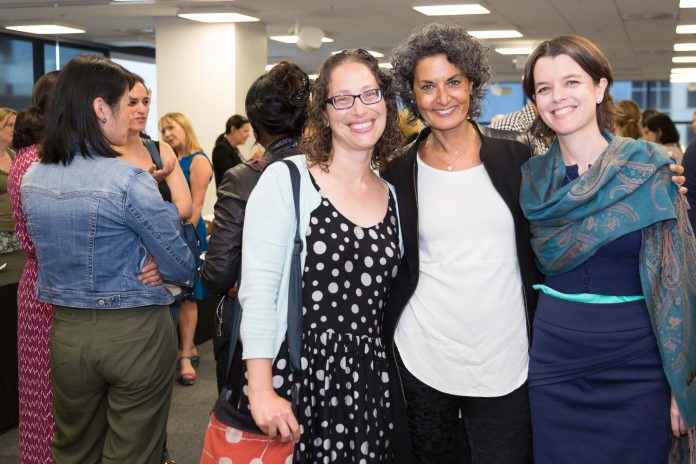I recently attended the inaugural conference of Australian Women of Medicine, in Melbourne on 26 November 2017. It was a wonderful day, and I trust it will be the first of many more to come.
The most striking thing about the conference was the feeling of cooperation, of togetherness in the room, of how powerful it felt to meet people of like heart and mind and to know we were not alone in how we felt and thought, and what a powerful force for change women working together can be in the world.
When women are with men, we tend to compete with them and with each other, and we can be each other’s own worst enemies. There was none of that feeling in the room…no checking each other out, dressing each other down, no one-up-man-ship, no competition or comparison; just a feeling of mutual appreciation and working together for a common purpose.
The speakers were diverse, and the focus was largely on our health and wellbeing – physical, mental, emotional and financial.
Financial health
The financial aspect was interesting, as during the presentations I heard women around me muttering that they did not have any money, so there was no point considering financial planning… which got me wondering… why is that? I know that I, as an eye surgeon in my mid-50’s, still have two large mortgages and old debts that I never seem able to pay off and I often have trouble finding enough money to pay the tax and super each month… and I am pretty sure not many of my male colleagues have the same financial problems at this age…
For ages we have been told that women in medicine don’t make as much money because we don’t work as much, or as hard, or we take time off to have the children, or we spend years working part time, and all of that may be true, but why do we as women bear the financial as well as the physical burden of having children?
We learned that women pay higher insurance premiums than men, largely because of the childbearing and rearing risks, and that pregnant women cannot get disability insurance, and we were assured this was not discrimination, but ‘actuarial’… again, why as women do we have to bear the financial burden of bearing children, as well as the children themselves? It takes two to tango, and perhaps it is time to spread the financial load a little and to make it possible for women to work without being financially disadvantaged just for being women.
There is also an aspect of many of us as women which does not value our services and ourselves enough… that wants to bulk bill everyone and spend an hour with them sorting out their whole life… but we need to balance this deep care and concern we have for people with an equal level of care for ourselves, and that includes valuing the cost of providing our services, or we are literally, physically and emotionally providing the care at our own expense.
Domestic violence
Rosie Batty gave a heartfelt talk on her experience of her son being brutally and publicly murdered by his father and of the years of domestic violence that led to that event. It was amazing to feel how this woman had turned this unthinkable tragedy into her life’s purpose… to bring awareness to all of us of the scope of domestic violence and to help us understand that it can happen to any of us…
The following basic statistics from the Our Watch(1) help demonstrate the prevalence and severity of violence against women:
- On average, at least one woman a week is killed by a partner or former partner in Australia.
- One in three Australian women has experienced physical violence, since the age of 15.
- One in five Australian women has experienced sexual violence.
- One in four Australian women has experienced physical or sexual violence by an intimate partner.
- One in four Australian women has experienced emotional abuse by a current or former partner.
- Women are at least three times more likely than men to experience violence from an intimate partner.
- Women are five times more likely than men to require medical attention or hospitalisation as a result of intimate partner violence, and five times more likely to report fearing for their lives.
- Of those women who experience violence, more than half have children in their care.(1)
Shocking though these statistics are, the truth is probably far worse.(2)
The ABS Personal Safety Survey showed that 95 per cent of men and 80 per cent of women who had experienced violence from a current partner had never contacted the police.(3)
A 2013 NSW survey, conducted by the Bureau of Crime Statistics and Research,(4) of 300 victims attending domestic violence services showed that only half reported their most recent incident to police and the most common reason for not reporting was fear of revenge or further violence.
Of course, domestic violence is not limited to women, but affects men and children too, indeed all of us, and it is something that can only be truly addressed by teaching respect and deep care for each other, no matter what.
Can women in medicine really change the world?
There was a wonderful panel discussion with four deeply inspiring women, and the general consensus was: Yes! Women in medicine can change the world and we are in fact very well placed to do so, for we connect deeply with many people every day and are trusted and respected by most. There are already many women doing amazing things, every day, and we are capable of so much more if we work side by side.
The most important message that I took home from the conference is that we are not here alone, and that we are not here to do it alone. A woman who is isolated and feels alone can be bullied, harassed, discriminated against and silenced, so that she feels powerless to be herself, let alone to change the world. If women stand together, we can call out abuse and support each other when the predictable backlash hits us. If we are on our own, we can play the “I said, they said” game and be discredited or ignored, but if we are all standing together, the truth will out.
The most wonderful feeling in the room was that there was not an ounce of ‘us against them’, of women standing together against men. The conference was hosted and supported by men, who were in the room and part of the day, and we as women appreciated their support and care deeply. We are not against men. We are just no longer willing to be against women, including ourselves.
And the true take home message is this: if women, including the women of medicine, stand together for the change that we all know is needed, it will be for the great benefit of all of us. Men too are feeling anxious, depressed, burnt out, exhausted and overwhelmed and it is time for all of us to care deeply for ourselves as people, and from that place of deep care, we will be able to truly care for ourselves and each other. And our world will change, including the world of medicine, from the inside out.
References:
- https://www.ourwatch.org.au/Understanding-Violence/Facts-and-figures
- http://www.abc.net.au/news/2016-04-06/fact-file-domestic-violence-statistics/7147938
- http://www.abs.gov.au/AUSSTATS/abs@.nsf/Latestproducts/25AF91125718ADF1CA257C3D000D856A?opendocument
- http://www.bocsar.nsw.gov.au/Documents/BB/bb91.pdf










I am glad you got so much out of the event which was a labour of love for my team and I to create.
Thanks Aaron, it was lovely to meet you and I truly appreciated the deep care you and your team held us all in.